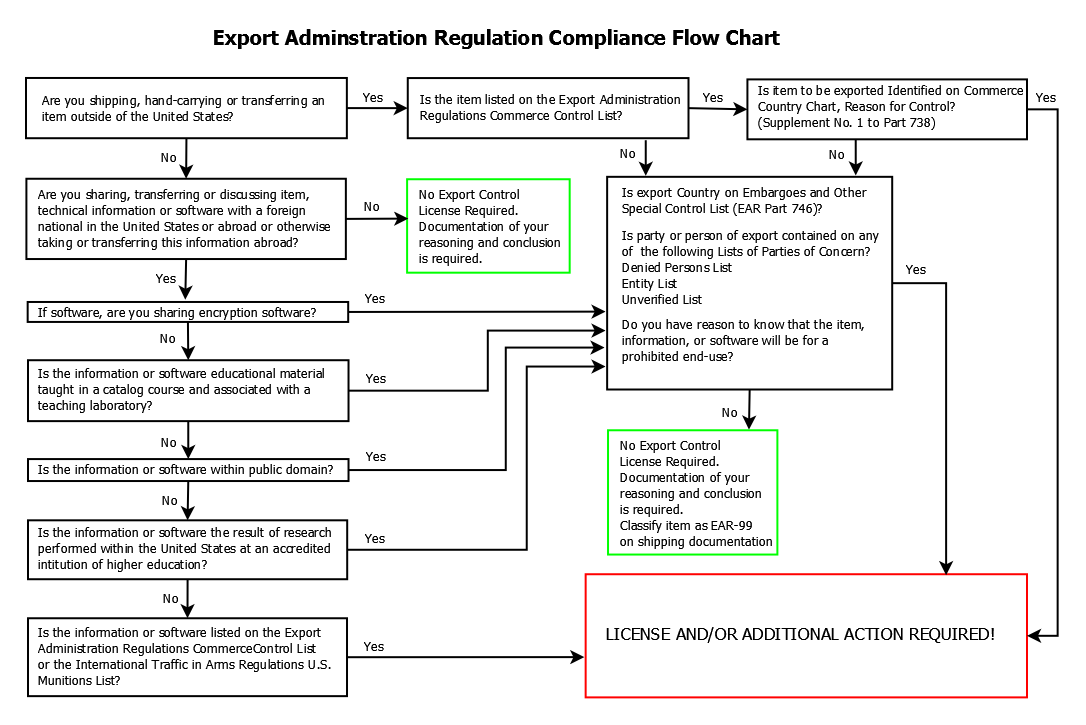


Export I Export Logistics & Regulation Compliance

Export Regulation Compliance
"During the course of the investigation, the government uncovered a pattern of violation of the export laws...." ---US Department of Justice U.S. Export
Control Laws and Regulations prohibit disclosure of certain information, technology and products to designated persons or entities, whether on U.S. soil ("deemed exports") or outside the U.S. Lists of sanctioned, prohibited, or regulated activities and entities are generated by the Departments of Commerce, Treasury, and State. There are very severe penalties for violation(s) of these laws or failure to comply with control policies and procedures. As the quote above implies, the penalties can apply both to the individual(s) and the company involved in a violation. Do not risk non-compliance!
The terms export, transfer and disclosure include traditional shipping, electronic transfer (email & websites), portable memory devices and personal/professional sharing of information. This also includes access by company personnel/employees, internal & external presentations and responses to quote requests (RFQs).
The federal laws forming the basis for these controls are administered by three governmental agencies and are universally described via acronyms:
• EAR: Export Administration Regulations - U.S. Commerce Department - Bureau of Industry and Security (BIS)
• ITAR: International Traffic in Arms Regulations – U.S. Department of State – Directorate of Defense Trade Controls (DDTC)
• OFAC: Office of Foreign Assets Control - U.S. Department of the Treasury
Commerce Department - EAR
The Export Administration Regulations ( EAR) are set forth in parts 730-774, of Title 15 of the Code of Federal Regulations (CFR), and issued by the Department of Commerce, Bureau of Industry and Security ( BIS) to implement the Export Administration Act and other statutory requirements. The EAR is amended by rules published in the Federal Register. The BIS is charged with the development, implementation and interpretation of U.S. export control policy for dual-use commodities, software, and technology. The Commerce Control List ( CCL) regulates commercial items, including these “dual-use” items that have commercial, military or proliferation applications.
All goods and services that are not covered under the State Department’s US Munitions List (USML) fall within EAR.
The basic concerns of the EAR are who is receiving/handling the item, who is the end-user, what is the end-use/application and what item technology is being exported. The handler, user and end application information is obtained with the Statement by Ultimate Consignee and Purchaser Form (End-User Statement Form BIS 711). Note that no item, license required or not, can be exported (without approval) if the receiving party or ultimate end-user is on any of the Lists of Parties of Concern. In addition, the Treasury Department's Specially Designated Nationals and Blocked Persons List (SDN), outlined in the OFAC section of this page, should also be verified prior to export or monetary transfer. Descriptions identifying export classification and export licensing requirements of dual-use commodities, software, and technology can be found on the Commerce Control List (CCL) . If an item is listed, the CCL will identify the Export Control Classification Number (ECCN) and Reason for Control. The Reason for Control should be checked against the Country Control Chart (Supplement No. 1 to Part 738) to verify if Control is applicable to the export Country. If yes, an export license is required.
A flow chart outlining Export Administration Regulation compliance procedures is presented below.

The Simplified Network Application Process - Redesign (SNAP-R) is The Bureau of Industry and Security (BIS) on-line system for Company Registration, obtaining a Company Identification Number (CIN) and submitting an Export License application. Once a License application has been submitted, it's progress can be monitored through the System for Tracking Export License Applications (STELA).
The BIS SNAP-R system is relatively efficient. However, it is important to know the system and the required documentation to support your Company's Export Management and Compliance Program. Manufacturers, exporters, and brokers are required to know all exported item's EAR CCL classification, licensing requirements and export declaration procedures. In addition, it is advantageous to understand time requirements of the Export Application process (i.e. Export License lead/delivery time).
In addition to Export Regulations, BIS is also responsible for the development, implementation and interpretation of the Anti-boycott provisions of the Export Administration Act. The Anti-boycott provisions encourage, and in some cases require, U.S. persons to refuse to participate in foreign boycotts that the United States does not sanction. U.S. persons are also required to report receipt of boycott-related requests.
The BIS advises that manufacturers and exporters have in place an Export Management and Compliance Program (EMCP) that assists in monitoring export and anti-boycott activities. These programs should include a manual that articulates the company’s policy on and commitment to compliance with regulations, and that outlines the procedures dealing with regulation and licensing compliance. Such a manual should also include the identification and duties of empowered and responsible persons, and procedures on record keeping and internal auditing.
Every organization should have an Export Management and Compliance Program (EMCP) that uniquely addresses their organization-specific requirements. An organization’s EMCP should be appropriate to the scope of its export and re-export activities and to its business circumstances. There is no generic, off-the-shelf, one-size-fits-all EMCP that could completely cover the great variety of different industries and business characteristics. By developing an organization-specific compliance program that is appropriately tailored to the nature of an organization’s export and re-export activities, an organization can implement an effective compliance program that works well. Factors such as the size of an organization, the end-use and sensitivity of products, the geographic location of business and customers, the relationships with business partners, volume of exports, product restrictions, and complexity of internal export processes will influence how an organization structures its operational EMCP.
We have over twenty years of export experience and can help you implement an Export Management and Compliance Program (EMCP) specifically tailored to your Company requirements. We meet with you to gain an understanding of you and your Company. We will discuss project scope, schedule and cost structure both verbally and in writing before moving forward. After establishing the required internal procedures and documentation, we train your personnel and work with you throughout the entire process, from export request (RFQ/Order), export license application, license tracking to item shipment. We also offer Export Brokerage services and one-on-one support.
State Department - ITAR
The Directorate of Defense Trade Controls (DDTC), Bureau of Political-Military Affairs (PM), in accordance with 22 U.S.C. 2778-2780 of the Arms Export Control Act (AECA) and the International Traffic in Arms Regulations (ITAR) (22 CFR Parts 120-130), is charged with Presidential control of exports and (temporary) imports of defense articles, and defense services, covered by the United States Munitions List (USML). The State Department also provides guidance on policy, designation of USML and issuance of export licenses. Any manufacturer or exporter of articles or services found on the USML is required to register with the DDTC, which helps to validate entities engaged in the defense trade. (www.pmddtc.state.gov).
The U.S. Government requires all manufacturers, exporters, and brokers of defense articles, related technical data and defense services as defined on the United States Munitions List-Part 121 to be ITAR compliant as follows:
• Register with the Directorate of Defense Trade Controls (DDTC). Registration is primarily a means to provide the U.S. Government with necessary information on who is involved in certain manufacturing, exporting and brokering activities. Registration does not confer any export rights or privileges, but is a precondition for the issuance of any license or other approval for export. Follow this link process and fees for ITAR registration.
• Know and comply with DDTC regulations and guidelines, including obtaining prior approval and license to export or to temporarily import a defense article, defense service, or technical data.
• Certify that they possess this knowledge and are in compliance.
To ensure compliance, the DDTC strongly advises that registered exporters and manufacturers have in place programs that assist in monitoring defense trade activities. These programs should include a manual that articulates the company’s policy on and commitment to compliance with defense trade laws and regulations, and that outlines the procedures for dealing with licensing and compliance matters. Such a manual should also include the identification and duties of empowered and responsible persons, and procedures on record keeping and internal auditing. The vast majority of products and companies do not fall under ITAR requirements. The key phrase in the USML-Part 121 of the ITAR is: A product..."which is specifically designed, modified or configured for military applications." Examples of items specifically designed, modified or configured for military applications include items developed under Defense Advanced Research Projects Agency (DARPA) Contracts, items developed under defense Contracts/Subcontracts containing non-recurring engineering (NRE) funding and items developed with internal funding specifically targeted for defense applications. Commercial, dual use items are subject to Export Administration Regulations (EAR - see below), but not necessarily ITAR requirements. If you are uncertain of your position, we can conduct an ITAR requirement verification before registration and implementing a compliance program. Please contact us for additional information at info@meyers-associates.com.
Treasury Department - OFAC
The Office of Foreign Assets Control (OFAC) of the US Department of the Treasury administers and enforces economic and trade sanctions based on US foreign policy and national security goals against targeted foreign countries and regimes, terrorists, international narcotics traffickers, those engaged in activities related to the proliferation of weapons of mass destruction, and other threats to the national security, foreign policy or economy of the United States. OFAC acts under Presidential national emergency powers, as well as authority granted by specific legislation, to impose controls on transactions and freeze assets under US jurisdiction. Many of the sanctions are based on United Nations and other international mandates, are multilateral in scope, and involve close cooperation with allied governments. The pertinent regulations provide OFAC with broad authority to block or interdict vaguely defined "prohibited transactions" involving restricted destinations or parties. A listing of individuals and companies owned or controlled by, or acting for or on behalf of, targeted countries are available at the Specially Designated Nationals and Blocked Persons List (SDN).
OFAC sanction compliance procedures should be incorporated in your Company's Export Management and Compliance Program (EMCP) outlined in the Commerce Department Section above.
The information presented herein is not to be considered as legal advice.